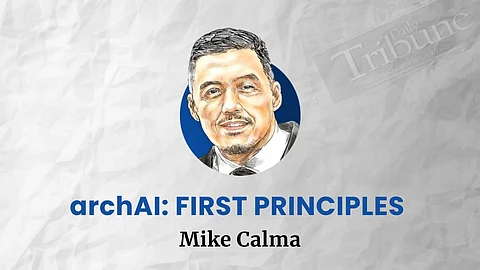
- NEWS
- the EDIT
- COMMENTARY
- BUSINESS
- LIFE
- SHOW
- ACTION
- GLOBAL GOALS
- SNAPS
- DYARYO TIRADA
- MORE

I’ve been having very interesting conversations lately: From executives and business owners to Jiu-jitsu family who call me “Tito Mike,” I’ve also gotten messages from strangers who read my last column (“AI is not gunning for your job”) and decided to open up.
All variations of the same worry:
“I used to feel proud of what I do. But AI can now do most of it.”
“I spend more time testing prompts than thinking.”
“I’m not sure what counts as ‘real work’ anymore.”
A good number had a similar concern that hit me harder than the rest. “What happens when your job isn’t a job, but just a series of tasks? And those tasks can now be automated?”
That was the moment I realized: we’re not really asking about AI. We’re asking what it means to work, in a time when the task is no longer enough.
Let’s not forget, we’ve seen this movie before.
• BPOs will take your job.
• The internet will take your job.
• Computers will take your job.
• Machines will take your job.
Now it’s AI’s turn on stage.
The fear isn’t new. What’s different is the speed — and the intimacy. AI doesn’t just take BPO roles or foreign ones. It takes the spreadsheet you built, the report you wrote, the email you carefully crafted. Then it does it faster.
For many in places like the Philippines, where jobs are often composed entirely of routine and repeatable tasks, the stakes are even higher. A friend once told me, “For some workers, especially in BPOs or service roles, there is no job beyond the task. When the task goes, so does the livelihood.”
That’s not a policy problem. That’s a paradigm shift.
□ □ □ □ □
There’s an old quote that says:
“To teach is to learn twice.”
It turns out, the same applies when we teach AI.
If we prompt mindfully — explaining clearly, thinking through logic, questioning assumptions — we sharpen our own thinking. But if we’re lazy about it, the AI starts reflecting us back at our worst: rushed, biased, and surface-level.
Left unchecked, we enter a kind of “Battle of the Brainless,” where everyone’s using the same tools, the same phrasing, the same shallow output — like a typical segment from Bubble Gang circa 1995, full of noise and punchlines but no plot — yet extremely entertaining.
If you grew up in the ’90s like I did — on PCs you assembled yourself, Nokia 5110s, and pirated UFC DVDs from Greenhills — you remember when martial arts was all mystery and myth.
Suddenly, styles were tested in the cage. Your fancy kata didn’t matter if it couldn’t stop a double leg takedown. Mystique gave way to mechanics. Hype gave way to results. Iterative development in action.
MMA demystified martial arts.
That’s what AI is doing to knowledge work.
What used to be seen as “specialized professional expertise” is now subject to the same test:
• Can you adapt under pressure?
• Can you tell noise from insight?
• Can you create value beyond what can be Googled, auto-completed, or ChatGPTed?
The AI is the cage.
The prompt is your sparring partner.
And the adjacent possible — the next idea, the next skill, the next leap — is where the magic happens.
So, back to that message I got:
“What happens when your job is just a set of tasks — and those tasks are now free?”
The answer might just be the same as it’s always been:
You move towards the adjacent possible.
You spar with your LLM of choice.
You drill to prompt with precision.
You focus on outcomes, not activities.
You rediscover the value of curiosity, judgment, synthesis, teaching.
You stop hiding behind the routine — and start showing up with intent.
The job is not the task.
The job is how you think when the task disappears.
Remember, a black belt is a white belt who never gave up. Oss!
□ □ □ □ □
Shameless plug:
Are You Ready for the Future of AI & Cybersecurity?
Artificial Intelligence and digital transformation are redefining industries at an unprecedented pace. At the same time, cybersecurity risks and third-party vulnerabilities present growing challenges for corporate boards. How can directors effectively govern these critical areas?
The Institute of Corporate Directors (ICD) Technology Governance Committee presents “Beyond the Algorithm: Exploring the Cybersecurity and AI Revolution”, a two-day learning session (29-30 May 2025) tailored for board members and executives looking to strengthen their oversight of AI, cybersecurity, and digital transformation.
Hear from the real experts:
• Mr. Henry Rhoel Aguda, secretary of the Department of Information and Communications Technology (DICT)
• Ms. Jennifer Tongco, president, CEO and founder of Netrust Philippines
• Mr. Paul Albert Sy Santos, lead consultant of Arrows Consulting
• Dr. Erika Fille Legarda, managing director and Chief AI and Data Officer at DepEd Center for AI Research
• Mr. Carmelo Alcala, director of MIS, Compliance, Risk and Audit, and Data Privacy Officer of Visaya Knowledge Process Outsourcing Corp.
• Mr. Manuel Joey Regala, president and CEO of CyberViser Inc.
• Mr. Romeo Fernando Aquino Jr., chairperson of the Institute of Corporate Directors’ Technology Governance Committee
Register here:
https://www.icd.ph/beyondthealgorithm2025
